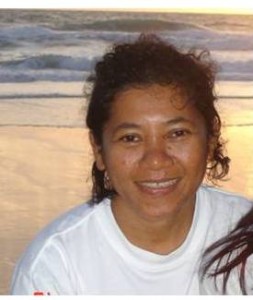Rio de Janeiro, Brazil- June 12 2012
In partnership with UN Women, the Women’s Major Group is proud to announce the recipients of travel funding to attend the Rio+20 meeting and participate in capacity building and Women’s Major Group advocacy work. This fund was generously provided by the Rockefeller Foundation to facilitate the participation of civil society, including grassroots women’s organizations in the Rio process.
Participants will participate in an advocacy training on June 13th, led by WEDO, which will include an introduction to the negotiations alongside technical language skills and a mock advocacy exercise.
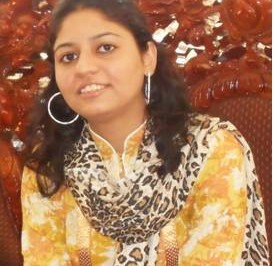 Fatima Zafar
Fatima Zafar
Fatima Zafar is a development professional and young women’s activist from Multan-Pakistan. She started her career in 2007 working for a local radio station, FM 103, and rapidly discovered after conducting many social and politically themed programmes that she wanted to work in the development field.
Soon thereafter, while working for AwazCDS, she was able to cultivate this passion and develop her knowledge further. It is here that Fatima wrote and significantly contributed to numerous analytical and research assignments, assessments, surveys, and other reports.
Fatima also played an active role in Peace Marches and International Days, and in SUTA Make Noise in support MDGs Global Call to Action against Poverty (GCAP): the United Nations Millennium Campaign (UNMCs) Project. As a result, she was nominated for Best Outstanding Communication Person by Minar Pimples Director UNMC.
Currently, she is employed at Malteser International as National Monitoring, Evaluation and Reporting Officer. On a voluntary basis she serves as a Board Member to Chanan Development Association (funded by UNFPA Pakistan) and offers health education trainings for the National Focal Point for Youth Peer Education Network. She also volunteers for other networks such as: Forgotten Dairies, World Pulse: an Online Network for Women Empowerment, South Asian Alliance for Budget Accountability, and the Fourth Global Institute Development Alternatives with Women for a New Era (DAWN).
Anchalee Phonklieng
Since 2011 Ms. Anchalee has been a full time volunteer for the Indigenous Women Network in Thailand (IWNT). The mission of this organization is to protect and promote the rights of indigenous women. Ms. Anchalee handles all managerial and organizational aspects of IWNT, plus has some project management responsibilities.
This native from Thailand has also worked for the Inter-Mountain Peoples Education and Culture in Thailand Association (IMPECT) as an advocate for women. She has served as a Consultant for Campaigning the Elimination on Violence against Women and for Women Participation in Natural Resources Management in the Tsunami Effected Areas of Thailand. She has been a Field Coordinator for the Southern Thailand Tsunami Affected Areas Rehabilitation and Strengthening (STAARS) and a Deputy Director for IMPECT. At IMPECT she is the Head of Gender and Capacity Building section.
Because of her work, she was a recipient of the British Chevening Scholarship which enabled her to obtain an LLM in Law in Development at the University of Warwick, UK.
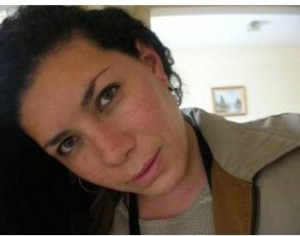 Carmen Capriles
Carmen Capriles
Carmen Capriles earned her degree in Agricultural Engineering with a specialty in Sustainable Development and Agro-ecology from the University of San Andres in La Paz, Bolivia. Her thesis titled: “The Role of Women in Natural Resources Management in the Community El Tigre” received great accolades from academia and won an award with honorable mention.
During her career she has attended numerous international conferences and taken courses at the Third DAWN Training Institute in South Africa. She has over 10 years of work experience as a consultant in Climate Change and Environmental Advocacy for national NGOs as well as International Cooperation. She has also been an environmental activist and a volunteer of such causes since 1998. She has coordinated and organized more than 20 campaigns for raising awareness about environment, defending biodiversity, and stopping climate change, among others. Today she coordinates activities for the 350.org Campaign in Bolivia, and is one of the founding-members of Reacción Climática, a volunteer-based organization dedicated to educating the people of Bolivia about climate change and what can be done to address it. As an international environmental advocate she is part of the Women´s Major Group for the RIO+20 Conference.
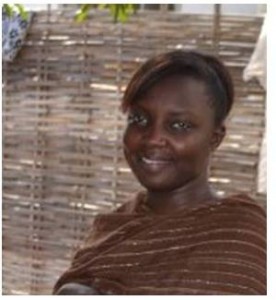 Winnie Kodi
Winnie Kodi
Winnie Kodi is young woman from the Nuba Mountains region in Sudan. She is pursuing a Bachelors of Arts degree in Communication with a focus on Public Relations and Advertising. Presently, she works as a Project Assistant in communication and outreach for Delibaya Nuba Women’s Development Organization.
In the past, she has worked with women in various projects, in particular those related to self help programs for economic gain. Furthermore, she has been very active helping the indigenous people of her country. She has been involved in the Global Environmental Fund (GEF) consultations for the establishment of Principles and Guidelines on Engagement of Indigenous Peoples. At the moment she is part of Indigenous Information Network, where she focuses mainly reporting about indigenous and minority people’s issues through the organization’s magazine and other in-house publications. She hopes to continue to promote and empower minority and indigenous women in her community.
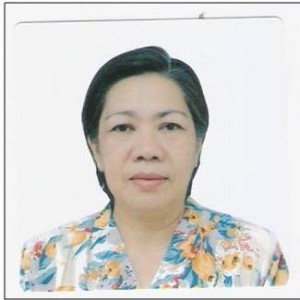 Feri G. Lumampao
Feri G. Lumampao
Ms. Lumampao has over 3 decades of accumulated experience in the development field. Since 1990, she has been involved in the development and implementation of sustainable development projects in Asia. For her magnificent work in one of these projects she won an award in the World Bank Development Marketplace in 2007.
Feri has also distinguished herself as an educator. She earned a Master’s Degree in Extension Education and completed her academic requirements in Doctor of Philosophy. Her background allowed her to become a regional and international trainer of courses related to appropriate technology transfer and development in Third World Countries.
On various occasions she has spearheaded and managed sustainable development projects with a women/gender focus in the areas of renewable energy, sustainable agriculture, ecologically-sound agro-forestry, environmental sanitation, water and sanitation, food processing and enterprise development, health and nutrition and responsible parenthood, among others.
Ms. Lumampao is currently the Executive Director of The Asian Alliance of Appropriate Technology Practitioners, Inc. (Approtech Asia) with members in 11 Asian countries. Approtech Asia is the National Focal Point of ENERGÍA (The International Network on Gender and Sustainable Energy). She is also a member of Gender and Water Alliance, Global Water Partnership, Water Supply and Sanitation Collaborative Council, Global Alliance of Clean Cookstoves, and the Gender Advocacy Team of WEDO in the UNFCCC.
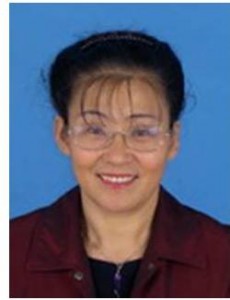 Zhao Huiyan
Zhao Huiyan
Zhao Huiyan (female, doctor), doctoral supervisor, was born in Shannxi Province. She is currently a Director of STSCRW (Science and Technique Service Centre for Rural Women in Shaanxi). STSCRW is an organization founded in September, 1997 which consists of women professors and research members of Northwest A & F University. It came from WID group in 1992.
The goals of STSCRW are to disseminate more sustainable agricultural technologies, reduce the use of pesticides, fertilizers, and additives, protect environment, and ultimately, alleviate poverty and generate secure livelihoods for rural women and farmers by using participatory approaches of gender sensitivity.
Approach of STSCRW:
Aimed at fighting poverty with technology, the STSCRW adopts the following approaches to carry out its projects:
- Changing people’s attitudes through training;
- Forming sustainable community-owned development fund;
- Forming and nurturing cooperatives. Promoting self-management through participatory approach with gender awareness to ensure sustainable development;
- Optimum utilization of local available resources to reduce the use of pesticides, fertilizers, hormones and additives;
- Participatory monitoring.
In both 2002 and 2004, STSCRF was given the ‘National Advanced Collective’ award and the ‘Shaanxi Provincial Advanced Collective ’ award . In 1997, 29 of their members were awarded as ’National Women’s Model’, one in particular as ‘National Women Pace-Setter’, 43 members as ‘Outstanding Provincial Technology Service Workers’, and 22 as ‘Yangling Women’s Models’.
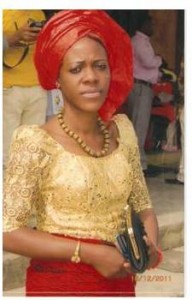 Caroline Usikpedo Omoniye
Caroline Usikpedo Omoniye
Caroline Usikpedo Omoniye is the founder and current National President of the Niger Delta Women’s Movement for Peace & Development (NDWPD). Ms. Usikpedo Omoniye founded this NGO in 2005 with the vision to empower the Niger Delta women and the most vulnerable people in the region. She has steadfastly worked to carry the message of her organization to global arenas and has reached out internationally to connect with other anti-poverty, environmental and women’s organizations and networks.
Consequently, NDWPD achieved Special Consultative Status with the United Nations ECOSOC. Caroline and the NDWPD have also participated as a Climate Witnesses in representation of the Niger Delta at the UNFCCC Copenhagen Summit on Climate Change in December 2009 and Durban COP 17. In Durban, during COP 17, at the Greenpeace solar tent, ICC Greenpeace and Feminist Task Force of GCAP partnership event, Caroline presented the outcome of the Tribunal on Women and Water of the Niger Delta using the case of Odi in Bayelsa State in Nigeria where testimonies were received from rural women who have lived in an environmentally degraded land polluted by oil spills, affected by fires, and without access to safe drinking water and sanitation.
Caroline has participated in ongoing global debates on gender, climate change and environment and will continue to share the Niger Delta cases with the world in hopes of raising awareness.
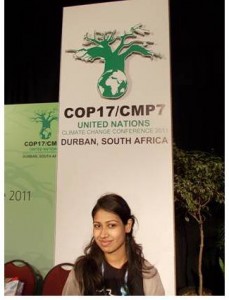 Armin Khan
Armin Khan
Armin Khan is a youth activist in Dhaka, Bangladesh who for the last five years has worked with nearly all the youth organizations is this city. She is a managing partner of the organization “Bangladesh Youth Movement for Climate.” Among her many accomplishments, Ms. Khan attended last year’s prestigious UNFCCC COP18 conference as the only youth representative from Bangladesh. Hence, this year she is forming a team of five to six members to represent Bangladeshi youth in said conference to be held in Qatar this November. Her intent is to generate more climate-smart young people who understand international climate politics and can serve as a voice for all the vulnerable nations of the world such as Bangladesh in the negotiation processes.
In the future Ms. Khan would like to initiate her own venture to continue to bring positive economic changes in the lives youth and the underprivileged people in her country through sustainable solutions.
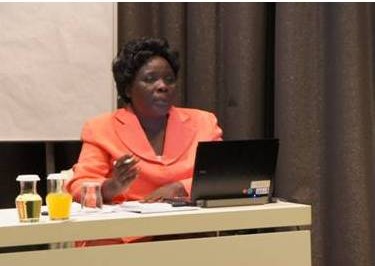 Joyce Rosemary Nangobi
Joyce Rosemary Nangobi
Ms. Nangobi is the Director of Slum Women’s Initiative for Development (SWID) in Jinja, Uganda. Through grassroots efforts SWID and Nangobi are devoted to advocating for women’s rights, in areas of land acquisition and housing. The organization also trains and mobilizes women, youth, and other leaders in areas of natural disasters and climate change, land and property inheritance rights, and home based care giving. In addition, she is the spokesperson for WLLA-Uganda, and the Regional Hub for Africa on matters concerning disasters and climate change.
Ms. Nangobi has also participated in a number of international meetings like International Land Coalition Meeting in Malawi 2011, consultative meeting with civil society and other experts to develop UNDP Africa Human Development Report in Johannesburg 2011, UN Governing Council meeting in 2007 (2009 and 2011), World Urban Forum in Rio, CSW 55 and 56 in New York 2011 (2012), and AWID meetings in Istanbul 2012.
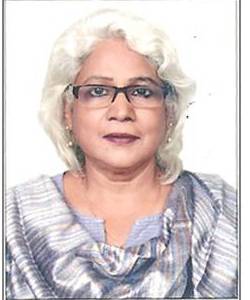 Zareen Myles
Zareen Myles
A native from New Delhi, India, Zareen is one of the founding members of Women’s Action for Development (WAFD) a grassroots NGO. She, as part of WAFD, has worked with women at the grassroots level for the last 30 years in the urban and rural areas of her country in different need based programs which range from education to skill training, self help groups, and health awareness.
WAFD provides small loans for women in urban areas of Delhi with the intent of aiding in income generation, education and health, so far 1500 women have benefitted. In the rural areas of the Sub Himalayan region of Tehri Gharwal she and WAFD work with women from 4 villages. In the Rajasthan, Bharatpur District, they work with 200 women from 7 villages.
In the last 10 years WAFD has become aware of the effects of climate change in these regions, and how it is affecting the women in various ways such as by increasing their work load. Therefore, their emphasis has been on teaching women how to take up small mitigation activities to overcome these changes. Some of these activities have included training on and promotion of organic farming, production of organic compost, renewable energy technologies namely bio gas plants, solar energy, kitchen gardening for better health and nutrition, as well as income generation techniques where possible.
 Isis Alvarez
Isis Alvarez
Isis Alvarez is a Colombian biologist, with a Master’s Degree on Environment and Resource Management from the Vrije University in Amsterdam. She lived in Amsterdam from 2005-2011, and worked for environmental and natural resource management organizations such as Friends of the Earth International (FoEI), IUCN-Netherlands and occasionally the Transnational Institute (TNI).
Isis has a broad experience in different subjects, which ranges from the study of the illegal wildlife trade in Colombia, the leopard-human conflicts in South Africa, to the organization and empowerment of fisher folk communities, peasant farmers, and women groups in Colombia and Mexico.
Since 2011, she has been involved with the Global Forest Coalition (GFC), communications division, and recently, joining the Genetically Engineered Trees campaign. GFC is a worldwide coalition of more than 50 environmental groups and Indigenous Peoples’ Organizations from over 31 different countries, which implements joint campaigns to promote rights-based, socially just forest policies at the international, national and local level. GFC played a key role in campaigns to raise awareness on the potential risks of forests and soil carbon sequestration in carbon markets on indigenous peoples and biodiversity, the risks of genetically modified trees (leading to the adoption of a de facto moratorium by the Biodiversity Convention), the impacts of agrofuels and large-scale wood-based biomass production.
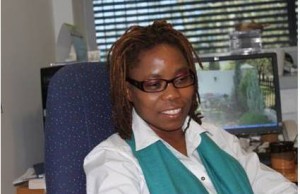 Nozipho Wright
Nozipho Wright
Nozipho Wright holds a Master’s Degree in Environmental and Energy Management, from the University of Twente, Netherlands. She is currently working as the Regional Network Coordinator for ENERGIA in Africa. ENERGIA is an international network on gender and sustainable development that has a direct presence in 13 countries on the continent. The Network provides a regional platform for policy advocacy, technical support to energy programmes and policies, capacity building, research and case study development on gender and energy.
Mrs. Wright also works for BOTEC, Botswana Technology Centre, as the Senior Communications Officer, for the Renewable Energy Programme. Furthermore, she is the project manager for Solar Lighting for Communal Areas, a gender sensitive energy project that aims to install 150 solar street lights in shared areas in six villages in Botswana.
Mrs. Wright is also a member of the Women’s Major Group Steering Committee, a committee that facilitates inputs on gender equality and women’s empowerment in the ongoing UNCSD Rio +20 negotiations.
Adi Va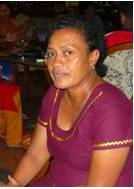 sulevu Merewalesi Levu Chute
sulevu Merewalesi Levu Chute
An Indigenous Fijian from Vanua Levu Is, North of Fiji, the Manager/ Trainer of the Pacific Centre for Peacebuilding- PCP and Convener for FemLINK Pacific. She manages and Co- Direct the partnership and programs of the 2 organizations- NGOs under one office based in Labasa, Northern Fiji. In 2011 she was awarded by the Fiji government to be a member of the Provincial Board Northern region representing NGO’s/ Civil Society Sector and communities for Sustainable Rural Development.
Her interest to study and work in the area of Peacebuilding evolved from her personal experience after the first political crisis, Fiji 1987 Military coup, her passion and commitment has earned her recognition and stronger stand and network with the general communities. From 1991 to 2000 she began her study in peacebuilding around the areas of Intercultural Awareness & Conflict Resolution, Conflict Transformation, Community Trauma healing, Mediation and Restorative Justice. She believed in pro-action and is a peacebuilding activist with the NGO and Civil Society Sector for the past two decades.
In 2000 she worked with the Ecumenical Centre for Research Education and Advocacy (Fiji Based) ECREA as a Peace Facilitator and performed the first post coup Needs Assessment in the rural villages in Fiji, and co- facilitated the first rounds of the Culture of Peace workshop in Fiji with the peace team in ECREA after 2nd and 3rd coup in Fiji. For gender empowerment and equality she joined FemLINK Pacific where she initiated its establishment in the North including the development of the first publication of the community radio times and the decentralization of community radio station FemTALK 89fm bringing the first Suitcase Radio- North, a strategy that provides to women and communities the documentation of their stories and the radio as a peacebuilding tool.
In 2007 she and a team of peace builders, trainers and consultant founded the Pacific Centre for Peacebuilding (PCP). Its first office was established in 2009 in Suva, capital of Fiji & Central Eastern region. Through her initiatives designer-Implementer she initiated the opening of the second office of the PCP North also in 2009, with particular focus in the decentralization of services for community access to sustainable development and peacebuilding. Based in the North from 2009- 2011 she established a stakeholder’s collaborative program “Helping Our Polluted Environment H.O.P.E to uphold Environmental Security ‘Thinking global Acting Local.
Currently 2010 – 2012 for PCP North program she is the consultant trainer of its projects and programs on ‘Women and Sustainable Livelihoods’ and the ‘Leading Transition’ training of 100 community facilitators with Good Governance and Peacebuilding as well as the Convener for Femlink Pacific North, facilitating the 1325 consultation of rural women leaders per month and mentor of Generation next team a young women’s project initiated by FemLINK Pacific.


